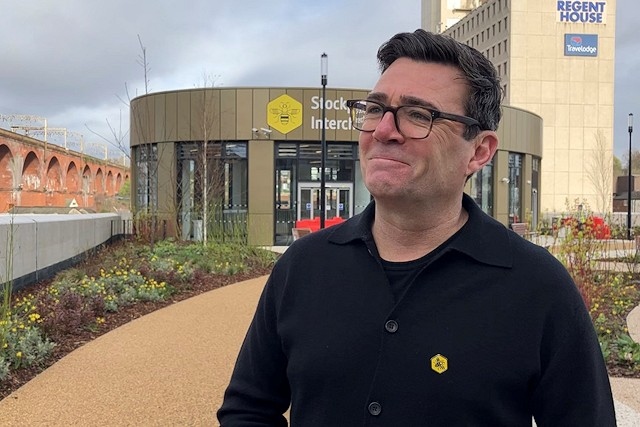Greater Manchester set for ‘transport revolution’ with Bee Network expansion and underground travel
Date published: 10 July 2024

Greater Manchester Mayor Andy Burnham at the launch of Stockport\'s new transport interchange
Greater Manchester is undergoing a ‘transport revolution’, with mayor Andy Burnham announcing a major Bee Network expansion – including a future underground network by 2050.
There are plans to bring eight existing railway lines in the region under local control by 2028; expand the Metrolink and create a London-style transport system with fully contactless tap in and tap out payments.
The railway line between Manchester Victoria and Rochdale is to be brought under local control, along with Wigan via Bolton; Wigan via Atherton; Wigan via Golborne; the Airport; Alderley Edge and Buxton via Stockport; Glossop; Hadfield and Rose Hill Marple via Guide Bridge and Ashton-under-Lyne & Stalybridge.
Bringing the lines under local control will help to bring ‘customer-facing improvements’ to the railways and increase the number of people who use them.
By January, bus franchising in Greater Manchester will be completed in every borough, with cheaper fares for seven-day and 28-day passes and the planned introduction of a years pass which residents can pay off weekly.
A new ‘hopper fare’ – allowing people to use as many Bee Network buses as they need to for one hour, without extra charge – will also be introduced.
That will be capped at £2 for adults and £1 for children and concessions – the same price as existing single tickets.
New Metrolink lines to Heywood, Middleton, Stockport, and Bolton are included in plans to improve connectivity, but a date has not been announced.
Read more: New map shows blueprint for Metrolink expansion around Greater ManchesterPublished: 11 July 2024
Mr Burnham said the region will ‘have to go underground by the middle of the century to ensure the region’s growth continues.
That would be done through tunnelling and creating underground ‘rapid transit’ travel networks, ‘going beyond the Bee Network’.
A Greater Manchester Combined Authority report said surface-level improvements ‘would only be capable of delivering modest and uncertain improvements in capacity and could be disruptive during construction’.
Plans being considered include creating a ‘regional Metro’-style solution, similar to the Paris RER, the Munich S-Bahn and London’s Elizabeth line, which could cost several billion pounds.
The report added there is ‘much work to do on the business case for any such investment’.
Mr Burnham told the Local Democracy Reporting Service: “There is a plan to deal with our economic growth by rapidly expanding the Bee Network via the conventional railway system.
“That can take Bee Network connectivity to places very quickly without building new lines. But there is a risk that the lack of transport connectivity and capacity in the end could become a barrier to growth in our city region.
“That’s why I would point to the need to go underground at some point, not do everything above the surface, and as any second city anywhere else in Europe has done, going underground to support continued economic growth and not put a limit on the economic growth of Greater Manchester.”
He added: “We’re not on the cusp of a transport revolution, we’re already in it, it’s happening. The yellow bus revolution is there, not for everyone in Greater Manchester to see yet, but it’s getting close and we’re confirming today that it will come to everywhere on January 5 – everybody will be part of the revolution at that point.
“By March, we’re saying we will have a fully contactless tap in tap out system. Beyond that, the revolution takes us to rail and we are increasingly confident of the plans we’re developing with the rail industry around eight existing railway lines coming into the Bee Network by 2028 within the mayoral term.
“It’s almost like doubling the size of Metrolink without having to build a new line, that itself is revolutionary in terms of the travelling experience for people.”
A Transport for Greater Manchester official said plans for an underground network are in the ‘early days’, but the proposal ‘needs to be kept open’.
He added: “From south-west to north-east, that’s very much where there’s pressure on Metrolink, so the starting point there is looking at the trams, but clearly we also have plans to bring in tram-train services in some of those routes, and there are options to bring in rail lines, so it needs to be kept open and flexible.
“On the north-west to south-east axis, the key pressure is around the Castlefield corridor, so I think that the early emerging work that we’ve got leans much more towards a regional-metro type service, but both of them need to be kept open.
“It’s early days on it, but we need to react to the fact that in the middle of this century the capacity pressure and the growth constraint needs to be addressed.”
Declan Carey, Local Democracy Reporter
Do you have a story for us?
Let us know by emailing news@rochdaleonline.co.uk
All contact will be treated in confidence.
Most Viewed News Stories
- 1Two men charged after incident at Manchester Airport in July
- 2Two men issued Community Protection Warnings for begging in dangerous 40mph zone
- 3Braving the cold: Fundraisers endure 60-hour sleepout to combat homelessness
- 4Mum wins minister's backing for campaign to prevent chronic fatigue syndrome deaths - following...
- 5Campaigners fighting to save Rochdale’s Seven Sisters backed by Rochdale Council and local MP
To contact the Rochdale Online news desk, email news@rochdaleonline.co.uk or visit our news submission page.
To get the latest news on your desktop or mobile, follow Rochdale Online on Twitter and Facebook.


